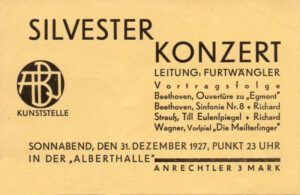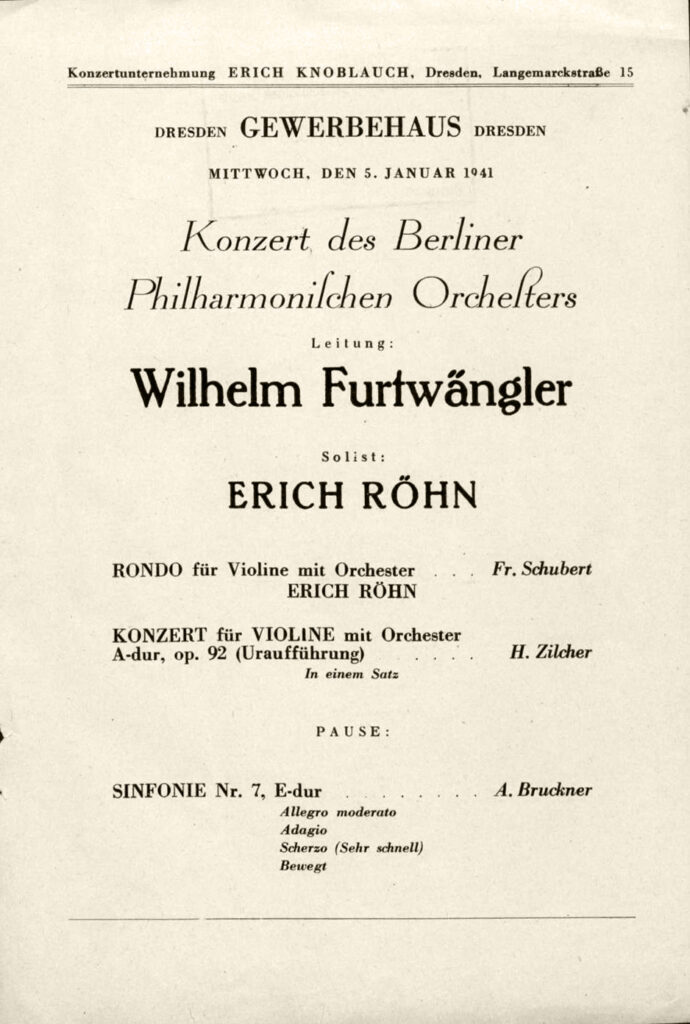Year: 2022
News
New Year’s Eve concerts are quite common, as are those on January 1st. For the last musical event marking the shift from 1927 to 1928, Furtwängler was in Leipzig. Request the programme!
And as a gift, this rare collector’s card — published by the cigarette manufacturer Josetti at the end of the 1920s — was one of a series of three dedicated to conductors (the other two: Weingartner and Blech), and was intended to fill an album entitled “Die Welt in Bildern” (The World in Pictures), along with sportsmen, actors, scientists and other famous people of the time.
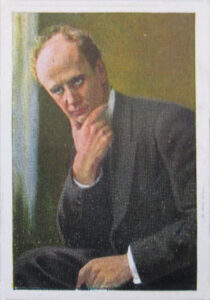
We regularly publish what we call “programme-pages”, i.e. — in the absence of the full programme — the precise page showing the details of a concert.
For this one, there is no corresponding evening in the list of concerts.
The brochure announcing the Berlin Staatskapelle’s subscription concert series (the symphonic season of the state opera orchestra) for 1934-1935 features Richard Strauss, Kleiber, Pfitzner, Jochum and… Furtwängler. It was scheduled for March 1st 1935, with, among others, the premiere of Hymnen for orchestra, opus 18 by Karl Höller.
But in the meantime, the “Hindemith case”, the political cabal against Furtwängler, who wearily threw in the towel and resigned from all his posts at the beginning of December 1934, had arisen. He did therefore not conduct this concert at the Staatskapelle…
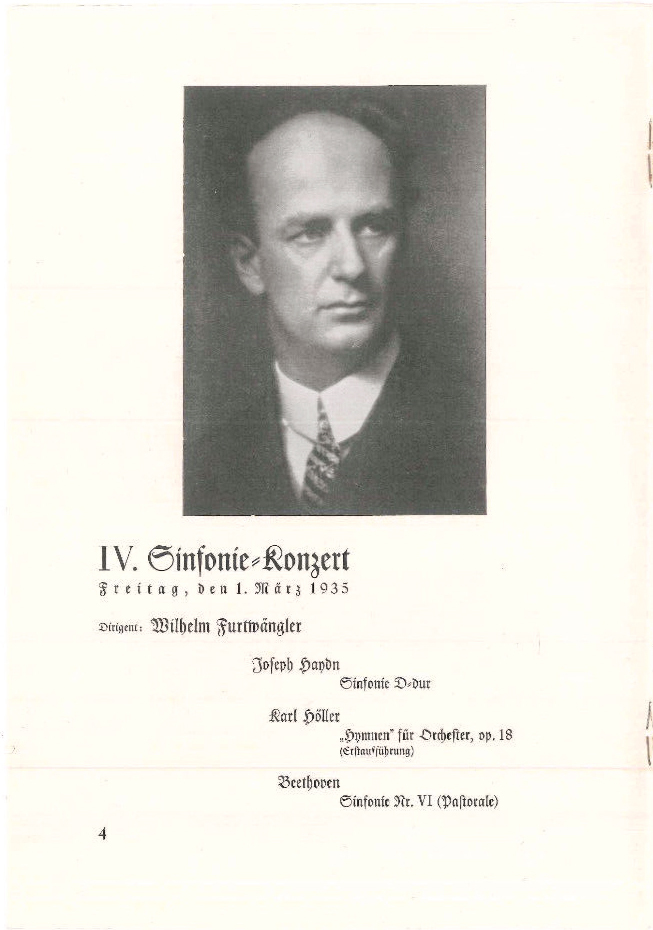
The annual General Meeting of the SWF was held on 26 November 2022. Here are the minutes, articulated around two documents (in French):
– the minutes themselves, according to the items discussed during the meeting (moral report, financial report, election of the bureau and miscellaneous)
– the President’s moral report
These documents are, of course, for the use of SWF members only.
When thinking about the Ring under Furtwängler’s baton, one thinks of the Ring at La Scala, or even the one at the RAI, or possibly the 1936 Bayreuth production, and one forgets the Ring produced at the Berlin Staatsoper in Autumn 1934. Directed by Heinz Tietjen and staged by Emil Preetorius, it seems to be a model of the upcoming Bayreuth production. The same team and a similar cast with Rudolf Bockelmann, Frida Leider, Franz Völker, Max Lorenz, Margarete Klose, Maria Müller and many others performing the leading roles — the best of Wagnerian singing at the time.
Here are these castings as they appear on the programmes. To see them more clearly, click on the corresponding page of the evening:
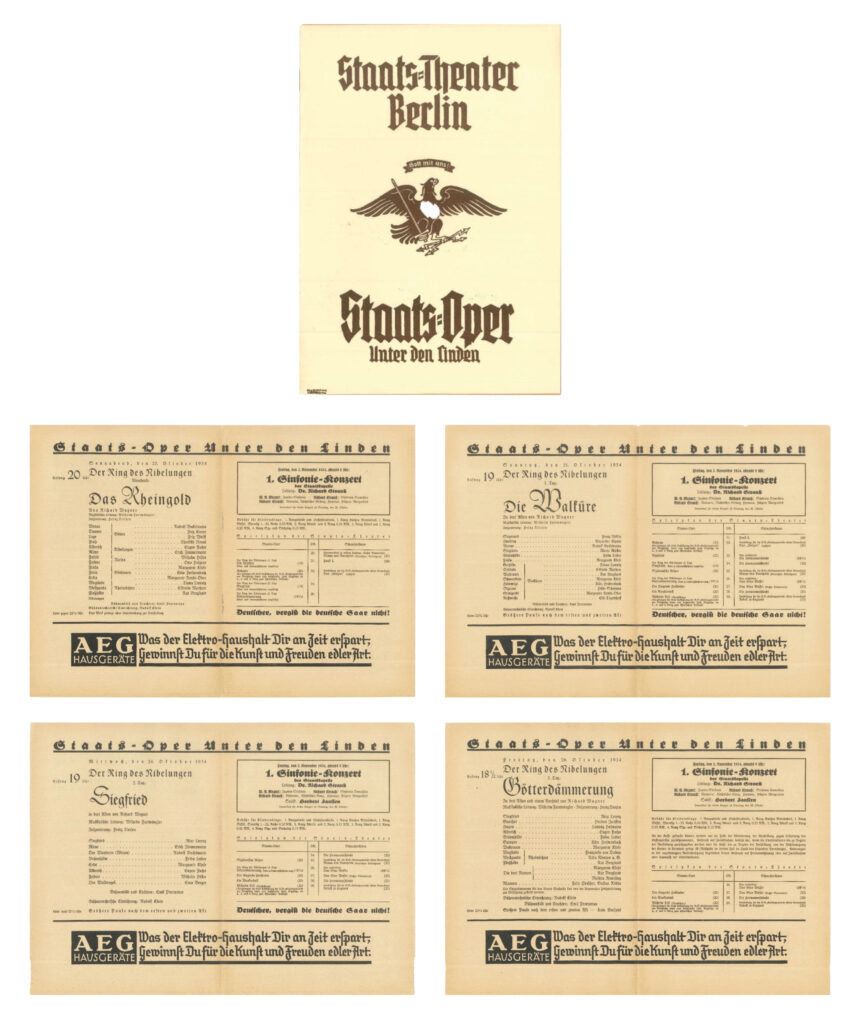
The conference on 15 December has been cancelled, much to our regret.
The next date is 26 January.

Christmas, the gift-giving season.
Treat yourself and your loved ones: SWF has thought of you and offers you compact discs at very low prices.
Here is something to fill the Christmas socks:
- SWF 942-43 Furtwängler à Paris (1954 – CD) 5 €
- SWJ 942-43 R Furtwängler in Paris (1954 – SACD) €5
- SWF 901 Beethoven/Pastoral/BPO 1944 3 €
- SWF 042-4 78 T Polydor (3 CDs ) €6
- SWF 062-64 Complete Brahms BPO €6
- SWF 921-2 Furtwängler in Hambourg €5
- SWF 941-R Beethoven/BPO 1943 €3
- SWF 971-2 Ein deutsches Requiem/Lucerne €5
- SWF 931 Furtwängler in Stuttgart €3
- SWF 091 Beethoven 2 & 8 €3
- SWF 101 Beethoven/Brahms/VPO 1943 €3
- SWF 121-3 Don Giovanni 1953 €5
- SWF 081-4 Die Meistersinger €6
- SWF 961-2 Furtwängler in Lucerne €5
- SWF 963 Bruckner/6th Symphony €3
Go to the shop — or better still, click on a reference above – to find out the details of each disc, and make your choice.
Dear members,
On 30 November, we all have a thought for the conductor and musician we admire. He died on this date but is still alive for us.
We are already thinking about the commemoration, in 2024, of the 70th anniversary of his death. That year will also be the Bicentenary of Anton Bruckner’s birth.
Before reporting back on the General Meeting which has just taken place, here is an overview of the studies which have been revised to match our graphic charter.
You will find — via this link — the republication of the exceptional and very complete study “Furtwängler in Italy”, written by Angelo Scottini in 1990, with a revised and expanded iconography, often with rare documents.
In a few weeks we should be able to read a revised “Furtwängler in Leipzig”, a study written more than thirty years ago by Philippe Jacquard.

Dear members,
The speaker who was supposed to give the conference on 15 December will not be able to do so.
We will come back to you soon in case we find a possibility for this conference to be held for the first time after so long.
Dear members,
Our Ordinary General Meeting will take place on 26 November. In preparation for this meeting, please find here:
1) The notice of meeting and the agenda for our OGM on 26 November
2) A Proxy, in case you can’t attend
3) The candidate list for the Executive Board
4) The reply form on whether or not you would like to attend the “pot de l’amitié” (get-together for drinks) which will take place at the end of the OGM
5) The document prepared by the candidate list in French, in English and in German.
Looking forward to seeing you again
We are carrying on with the redesign of past studies. The study on Furtwängler’s years in Lübeck, published as a paper brochure and scanned as such, is now presented in the new graphic charter.
However, due to its length, it was not possible to translate it into English.
Everyone who makes frequent use of the list of Furtwängler’s concerts featured on this site knows that almost all of the concerts are listed. There are however still a number that do not give details of the programmes, principally the concerts given by the BPO during tours at the end of the 1930s and the very early 1940s. As new information is found, we are keen to complete our documentation.
And that is the case with this BPO concert in Dresden, given at the beginning of 1941 in the ‘Gewerbehaus’, the home of the city’s Philharmonic Orchestra. Our list agrees with Peter Muck’s voluminous tome on the Berliners, showing the date as 5 February, yet the official programme — reproduced below — gives it as 5 January. Which prompts us to ask whether we are all wrong.
Not at all! If Erich Knoblauch, the concert agent, had consulted his calendar, he would have noticed that ‘5 Januar’ was not a ‘Mittwoch’ (Wednesday) as he writes, but a ‘Sonntag’ (Sunday), whereas 5 February was indeed a Wednesday. And, when under Hermann Zilcher’s Concerto he added the word ‘Uraufführung’, he was well aware that the official world premiere would take place in Berlin, during the series of subscription concerts on 2, 3 and 4 February. The day after the last of these concerts, on their visit to Dresden, the Berliners only needed to repeat the same programme (with the exception of the Overture to The Bartered Bride by Smetana).
Finally, for those who might be interested, this Concerto (no 2) by Zilcher can be heard on Youtube.

